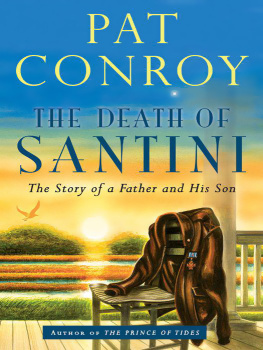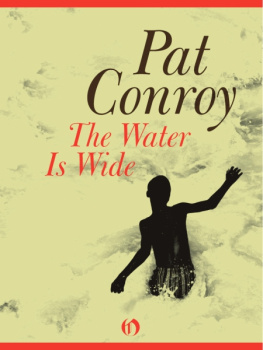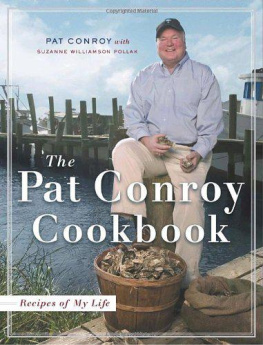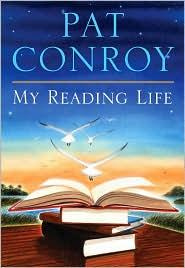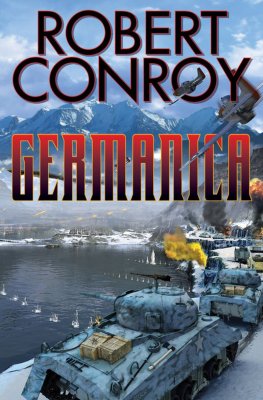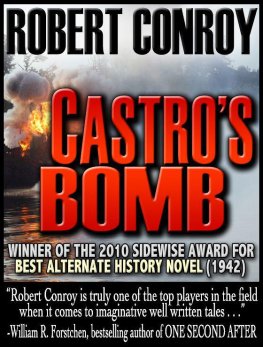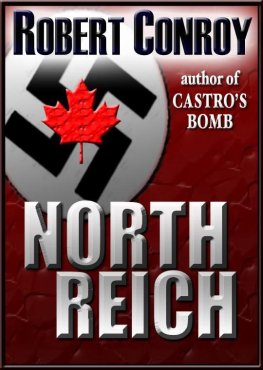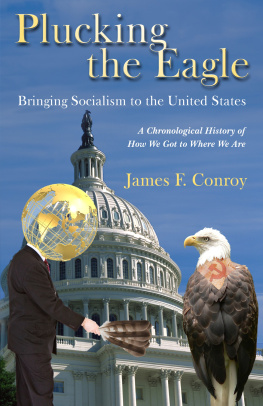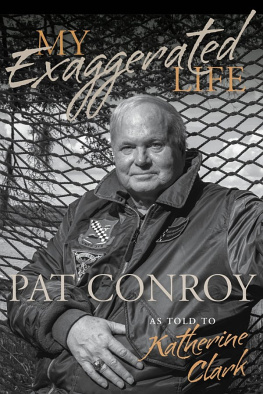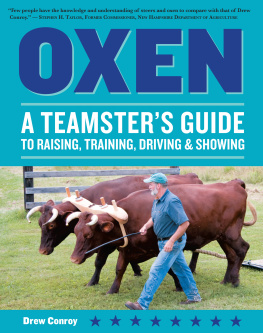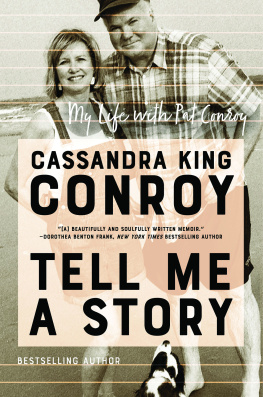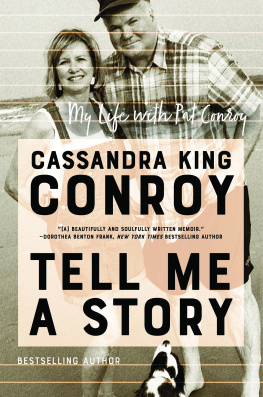Pat Conroy - South of Broad
Here you can read online Pat Conroy - South of Broad full text of the book (entire story) in english for free. Download pdf and epub, get meaning, cover and reviews about this ebook. year: 2009, publisher: Nan. A. Talese, genre: Art. Description of the work, (preface) as well as reviews are available. Best literature library LitArk.com created for fans of good reading and offers a wide selection of genres:
Romance novel
Science fiction
Adventure
Detective
Science
History
Home and family
Prose
Art
Politics
Computer
Non-fiction
Religion
Business
Children
Humor
Choose a favorite category and find really read worthwhile books. Enjoy immersion in the world of imagination, feel the emotions of the characters or learn something new for yourself, make an fascinating discovery.

- Book:South of Broad
- Author:
- Publisher:Nan. A. Talese
- Genre:
- Year:2009
- Rating:5 / 5
- Favourites:Add to favourites
- Your mark:
- 100
- 1
- 2
- 3
- 4
- 5
South of Broad: summary, description and annotation
We offer to read an annotation, description, summary or preface (depends on what the author of the book "South of Broad" wrote himself). If you haven't found the necessary information about the book — write in the comments, we will try to find it.
South of Broad — read online for free the complete book (whole text) full work
Below is the text of the book, divided by pages. System saving the place of the last page read, allows you to conveniently read the book "South of Broad" online for free, without having to search again every time where you left off. Put a bookmark, and you can go to the page where you finished reading at any time.
Font size:
Interval:
Bookmark:
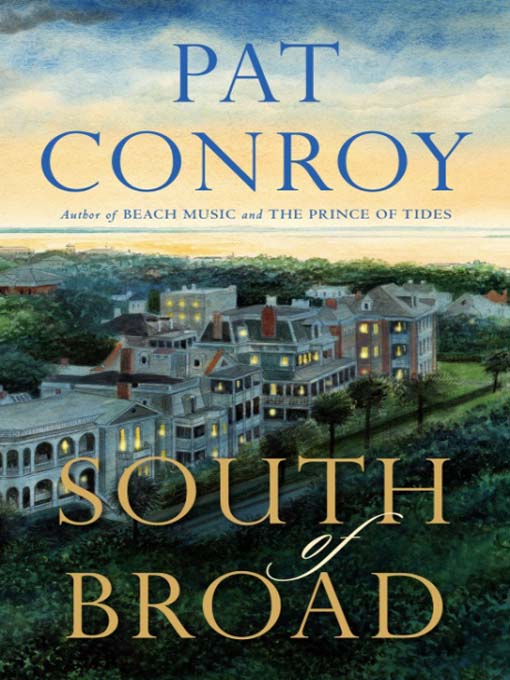
ALSO BY PAT CONROY
The Boo
The Water Is Wide
The Great Santini
The Lords of Discipline
The Prince of Tides
Beach Music
My Losing Season
The Pat Conroy Cookbook: Recipes of My Life
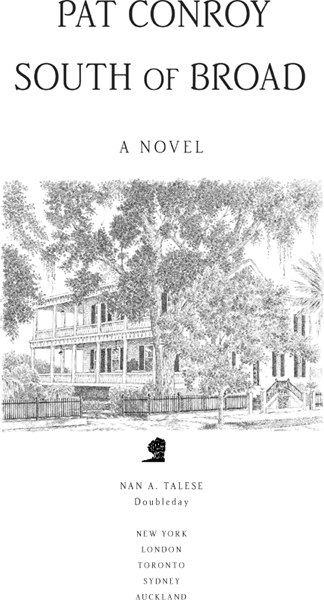
This book is dedicated to my wife and fellow novelist,
Cassandra King, who helped more than anyone in bringing
South of Broad to its publication. To me, she is the finest
thing ever produced on an Alabama farm.
The Mansion on the River
I t was my father who called the city the Mansion on the River.
He was talking about Charleston, South Carolina, and he was a native son, peacock proud of a town so pretty it makes your eyes ache with pleasure just to walk down its spellbinding, narrow streets. Charleston was my fathers ministry, his hobbyhorse, his quiet obsession, and the great love of his life. His bloodstream lit up my own with a passion for the city that Ive never lost nor ever will. Im Charleston-born, and bred. The citys two rivers, the Ashley and the Cooper, have flooded and shaped all the days of my life on this storied peninsula.
I carry the delicate porcelain beauty of Charleston like the hinged shell of some soft-tissued mollusk. My soul is peninsula-shaped and sun-hardened and river-swollen. The high tides of the city flood my consciousness each day, subject to the whims and harmonies of full moons rising out of the Atlantic. I grow calm when I see the ranks of palmetto trees pulling guard duty on the banks of Colonial Lake or hear the bells of St. Michaels calling cadence in the cicada-filled trees along Meeting Street. Deep in my bones, I knew early that I was one of those incorrigible creatures known as Charlestonians. It comes to me as a surprising form of knowledge that my time in the city is more vocation than gift; it is my destiny, not my choice. I consider it a high privilege to be a native of one of the loveliest American cities, not a high-kicking, glossy, or lipsticked city, not a city with bells on its fingers or brightly painted toenails, but a ruffled, low-slung city, understated and tolerant of nothing mismade or ostentatious. Though Charleston feels a seersuckered, tuxedoed view of itself, it approves of restraint far more than vainglory.
As a boy, in my own backyard I could catch a basket of blue crabs, a string of flounder, a dozen redfish, or a net full of white shrimp. All this I could do in a city enchanting enough to charm cobras out of baskets, one so corniced and filigreed and elaborate that it leaves strangers awed and natives self-satisfied. In its shadows you can find metalwork as delicate as lace and spiral staircases as elaborate as yachts. In the secrecy of its gardens you can discover jasmine and camellias and hundreds of other plants that look embroidered and stolen from the Garden of Eden for the sheer love of richness and the joy of stealing from the gods. In its kitchens, the stoves are lit up in happiness as the lamb is marinating in red wine sauce, vinaigrette is prepared for the salad, crabmeat is anointed with sherry, custards are baked in the oven, and buttermilk biscuits cool on the counter.
Because of its devotional, graceful attraction to food and gardens and architecture, Charleston stands for all the principles that make living well both a civic virtue and a standard. It is a rapturous, defining place to grow up. Everything I reveal to you now will be Charleston-shaped and Charleston-governed, and sometimes even Charleston-ruined. But it is my fault and not the citys that it came close to destroying me. Not everyone responds to beauty in the same way. Though Charleston can do much, it cant always improve on the strangeness of human behavior. But Charleston has a high tolerance for eccentricity and bemusement. There is a tastefulness in its gentility that comes from the knowledge that Charleston is a permanent dimple in the understated skyline, while the rest of us are only visitors.
My father was an immensely gifted science teacher who could make the beach at Sullivans Island seem like a laboratory created for his own pleasures and devices. He could pick up a starfish, or describe the last excruciating moments of an oysters life on a flat a hundred yards from where we stood. He made Christmas ornaments out of the braceletlike egg casings of whelks. In my mothers gardens he would show me where the ladybug disguised her eggs beneath the leaves of basil and arugula. In the Congaree Swamp, he discovered a new species of salamander that was named in his honor. There was no butterfly that drifted into our life he could not identify by sight. At night, he would take my brother, Steve, and I out into the boat to the middle of Charleston Harbor and make us memorize the constellations. He treated the stars as though they were love songs written to him by God. With such reverence he would point out Canis Major, the hound of Orion, the Hunter; or Cygnus, the Swan; or Andromeda, the Chained Lady; or Cassiopeia, the Lady in the Chair. My father turned the heavens into a fresh puzzlement of stars: Ah, look at Jupiter tonight. And red Mars. And isnt Venus fresh on her throne? A stargazer of the first order, he squealed with pleasure on the moonless nights when the stars winked at him in some mysterious, soul-stirring graffiti of ballet-footed light. He would clap his hands with irresistible joy on a cloudless night when he made every star in the sky a silver dollar in his pocket.
He was more North Star than father. His curiosity about the earth ennobled his every waking moment. His earth was billion-footed, with unseen worlds in every drop of water and every seedling and every blade of grass. The earth was so generous. It was this same earth that he prayed to because it was his synonym for God.
My mother is also a Charlestonian, but her personality strikes far darker harmonies than my fathers did. She is God-haunted and pious in a city with enough church spires to have earned the name of the Holy City. She is a scholar of prodigious gifts, who once wrote a critique of Richard Ellmans biography of James Joyce for the New York Review of Books. For most of my life she was a high school principal, and her house felt something like the hallway of a well-run school. Among her students, she could run a fine line between fear and respect. There was not much horseplay or lollygagging about in one of Dr. Lindsay Kings schools. I knew kids who were afraid of me just because she was my mother. She almost never wears makeup other than lipstick. Besides her wedding band, the only jewelry she owns is the string of pearls my father bought her for their honeymoon.
Singularly, without artifice or guile, my mothers world seemed disconsolate and tragic before she really knew how tragic life could be. Once she learned that no life could avoid the consequences of tragedy, she softened into an ascetics acknowledgment of the illusory nature of life. She became a true believer in the rude awakening.
My older brother, Steve, was her favorite by far, but that seemed only natural to everyone, including me. Steve was blond and athletic and charismatic, and had a natural way about him that appealed to the higher instincts of adults. He could make my mother howl with laughter by telling her a story of one of his teachers or about something he had read in a book; I could not have made my mother smile if I had exchanged arm farts with the Pope in the Sistine Chapel. Because I hero-worshipped Steve, it never occurred to me to be jealous of him. He was both solicitous and protective of me; my natural shyness brought out an instinctive championing of me. The world of children terrified me, and I found it perilous as soon as I was exposed to it. Steve cleared a path for me until he died.
Font size:
Interval:
Bookmark:
Similar books «South of Broad»
Look at similar books to South of Broad. We have selected literature similar in name and meaning in the hope of providing readers with more options to find new, interesting, not yet read works.
Discussion, reviews of the book South of Broad and just readers' own opinions. Leave your comments, write what you think about the work, its meaning or the main characters. Specify what exactly you liked and what you didn't like, and why you think so.

